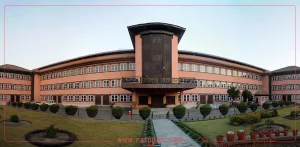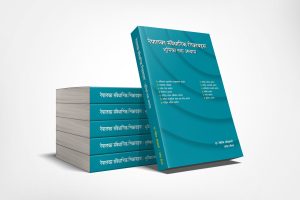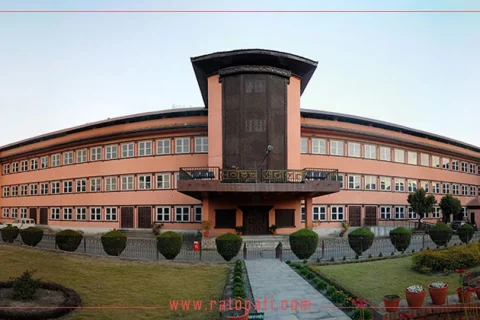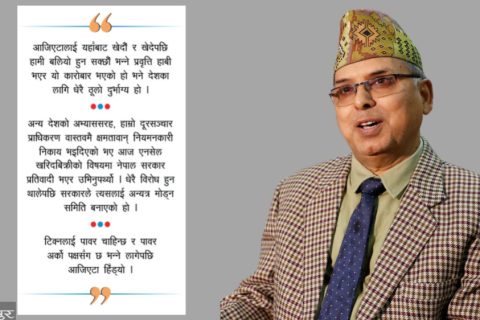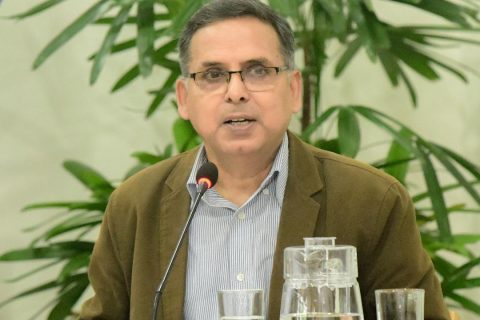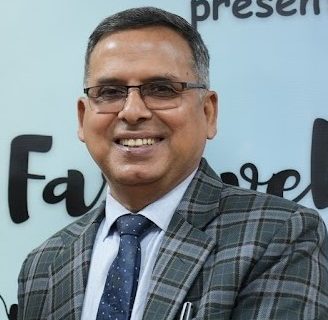At a time when the Supreme Court has expedited hearing on the writ petitions against the dissolution of the House of Representatives, Speaker Agni Sapkota is busy holding one meeting after another to discuss the May 21 dissolution and the political situation it has brought about.
He has called an all-party meeting for Friday with the chairs and senior leaders of the parties represented in the dissolved lower house. Along with the former prime ministers, his invitees include Prime Minister and CPN-UML Chair KP Sharma Oli, also a primary defendant in the House dissolution case.
Sapkota himself is one of the defendants.
Some constitutional experts say Sapkota calling meetings is setting a bad precedent against constitutionalism and rule of law. They say the meetings are wrong for two reasons. First, holding discussions on a sub-judice case is against the democratic practice and second, the Speaker’s position is a neutral post, so Sapkota shouldn’t be seen taking sides.
Bipin Adhikari, a former dean at Kathmandu University School of Law, said Sapkota is trying to practice a shadow parliament by calling all party meetings, which is undemocratic.
“He is also challenging another state organ (judiciary) by holding discussion on a sub-judice case,” he told the Post. “Sapkota is equally responsible for present anomalies in the democratic system of the country.”
Among the three state organs Sapkota leads one—legislature.
He has already held meetings with former Speakers and constitutional and legal experts. In both the meetings, a majority of the participants said that the dissolution was unconstitutional while some of the constitutional experts even argued that Sapkota holds a privilege to call the session of the House.
According to Shreedhar Neupane, a press advisor to Sapkota, the Friday’s meeting has been called to discuss contemporary issues. Though he didn’t dwell on the details about the meeting, the officials at the Parliament Secretariat say as Sapkota has already made his position clear that the dissolution is unconstitutional, he is lobbying to establish what he believes.
“It is natural for one to lobby for the position he has taken,” a senior official at the Parliament Secretariat told the Post on condition of anonymity. “Friday’s meeting is its continuation. He will be holding more of such meetings in the days to come.”
Oli’s aides have publicly said he wouldn’t be participating in the meeting. People from Sapkota’s secretariat say they expect participation of all political parties except from the Oli-led faction of the UML.
According to Adhikari, Sapkota has indulged in unwarranted activism mainly after the first dissolution of the lower house on December 20 last year. He had issued a statement claiming the dissolution was unconstitutional which he repeated this time as well.
Sapkota’s move in January to return the Constitutional Council’s recommendations to various constitutional bodies back to the council had run into controversy.
On January 31, he had returned the recommendations forwarded by the council, saying that there was no possibility of holding the hearing of the appointees as the House of Representatives did not exist. He, however, had not consulted with the chair of the National Assembly, though the Parliamentary Hearing Committee is composed of the members from both houses.
The regulation of the parliament makes it mandatory for both the houses to have a consultation on the issues related to the jurisdiction of both the houses. Similarly, in an unprecedented move, Sapkota on February 5 filed a writ petition against the Office of the President and chief of executive–Oli–and head of judiciary Chief Justice Cholendra Shumsher Rana over the appointments in the constitutional bodies.
As many as 32 chairs and the members of 11 different constitutional commissions on February 3 had taken an oath of office and secrecy in an event organised at the President’s Office.
The recommendations had been made on December 15 after the Constitutional Council (Functions, Duties and Procedure) Act-2010 had been amended through an ordinance that allowed for the meeting of the Constitutional Council to be held with the majority of the existing members of the Council. The recommendation to appoint the 38 members of constitutional bodies had been made without the presence of the Speaker and the leader of the main opposition in Parliament since they had opposed the amendment.
Sapkota’s move to challenge the head of two other state agencies and the head of the state too became the issue of criticism.
“Sapkota’s activism is not natural,” Raju Prasad Chapagain, chair of the Constitutional Lawyer’s Forum, told the Post. “His activities are taking a toll on the integrity of the institution he is leading.”
He says Sapkota’s moves are more like a leader of a particular party rather than a one who holds a neutral position leading one of the three state organs.
The Speaker has to resign from the membership of his/her party the day they are elected to the position. Sapkota was elected the Speaker as a candidate from the erstwhile Nepal Communist Party (NCP) in January 2020. He has been close to the Communist Party of Nepal (Maoist Centre) Chair Pushpa Kamal Dahal for a long time.
Experts say Sapkota’s activities seem to be influenced by the position his former party takes.
Adhikari says it is his constitutional obligation to play an impartial role which should be reflected in his actions. “It seems under some provocation Sapkota is trying to give a symbolic message while the writ petitions are sub judice,” he said. “He should refrain from any of such activism and wait for the law to take its course.”
The Supreme Court on Wednesday announced to start continuous hearing on the petitions from June 23 after receiving written clarification from the defendants. It has given seven days to the Office of President, the Prime Minister’s Office, Oli and federal parliament to furnish clarification. The Rana-led Constitutional Bench has decided to conclude the hearing within 32 hours.
“Sapkota is competing with Oli in breaching the rule of law,” said Chapagain. “He must understand in the name of attacking Oli’s move, he is committing one mistake after another.”


